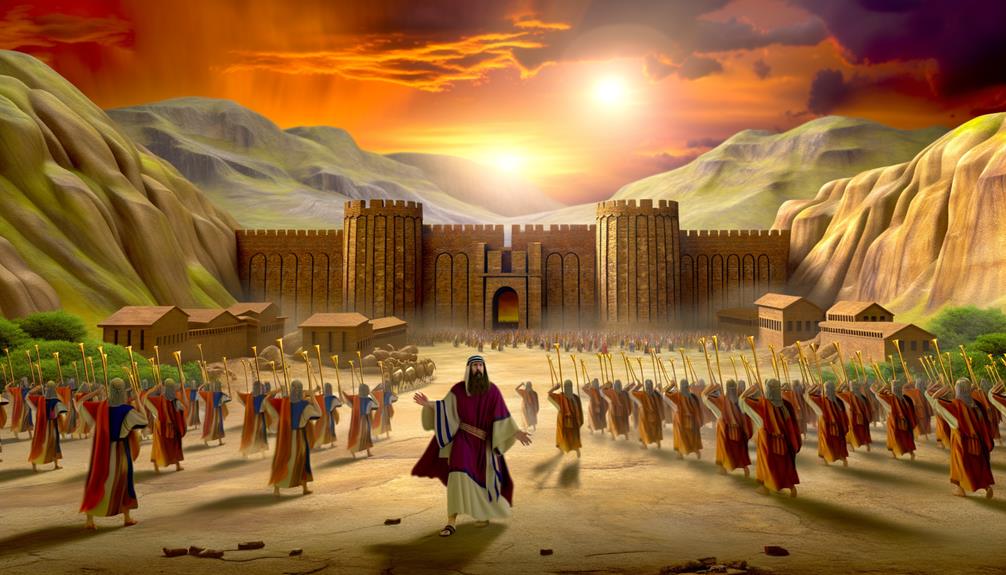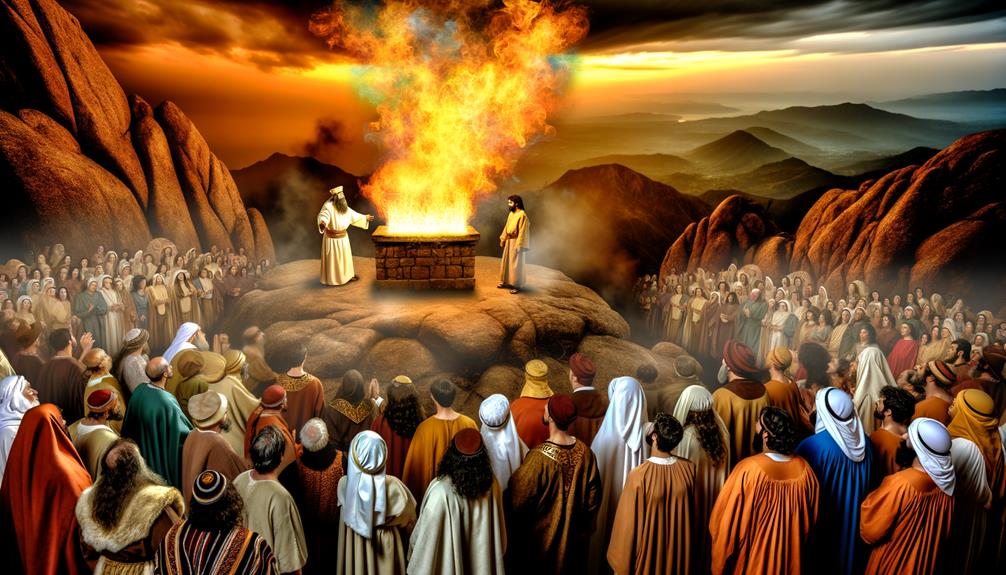Leap of Faith Meaning in the Bible: Trust in Action
In the Bible, the ‘leap of faith‘ embodies profound trust in God’s promises and directives, often seen in acts of unwavering obedience without empirical evidence. This theological concept is vividly portrayed through narratives such as Abraham’s journey, Moses parting the Red Sea, and David facing Goliath, all illustrating a shift from human understanding to divine reliance.
These stories highlight the interplay between faith, action, and divine providence, calling for moral courage and covenantal fidelity. As explored in these biblical accounts, this leap represents a commitment to divine wisdom, encouraging deeper insights into faith’s transformative power.

Leap of Faith Meaning in the Bible: Trusting God Beyond the Unknown
| Aspect | Details |
|---|---|
| Definition | A decision to trust God completely and act on faith, even when outcomes are uncertain or unseen. |
| Biblical References | Hebrews 11:1, Matthew 14:29-31 (Peter walking on water), Proverbs 3:5-6 |
| Purpose | To demonstrate trust in God’s promises and His plan, even in challenging or uncertain circumstances. |
| Examples | Abraham leaving his homeland (Genesis 12:1-4), Moses leading Israel through the Red Sea (Exodus 14:21-22). |
| Modern Relevance | Encourages believers to rely on faith in making life decisions and facing challenges, trusting in God’s guidance. |
Definition in Scripture

In Scripture, the concept of a ‘leap of faith‘ is often encapsulated through narratives that illustrate unwavering trust in God’s promises despite uncertain or seemingly insurmountable circumstances.
This notion is not merely an act of blind belief but a profound, deliberate trust in divine providence.
Rooted in Hebrew and Christian texts, a leap of faith entails a conscious decision to adhere to divine will, despite the absence of tangible evidence or assurance.
Such faith is exemplified through acts of obedience and surrender, reflecting a deep relational trust in God’s character and intentions. This kind of faith is not just blind belief, but it is a commitment to follow God’s will and trust in His guidance even when it is difficult or goes against our own desires. It is rooted in the biblical meaning of perseverance, which encourages us to endure through trials and tribulations with unwavering faith and trust in God’s plan. This kind of faith requires a constant reliance on God’s strength and a willingness to surrender our own will to His, even when it is challenging.
Fundamentally, it involves a shift from human understanding to a reliance on divine wisdom, embodying a theological commitment that transcends empirical certainties.
Abraham’s Call

Abraham’s call in the Bible epitomizes the concept of a leap of faith through his unwavering obedience to a divine command to leave his homeland and journey to an unknown land.
This act of trust not only signifies a profound commitment but also sets the stage for the establishment of a covenant between God and Abraham, encompassing promises of blessings and progeny.
Reflecting on Abraham’s experience offers a profound understanding of faith as an interplay between divine instruction and human response.
Divine Command and Obedience
Responding to the divine command, Abraham’s journey epitomizes the profound act of obedience and faith central to biblical narratives. His readiness to heed God’s call reflects a trust in divine wisdom, transcending human understanding.
This narrative invites scrutiny into the nature of faith, which is not merely belief, but active compliance with divine instructions. Abraham’s unwavering obedience showcases several key themes:
- Faith as Action: True faith necessitates not only belief but corresponding actions.
- Divine Sovereignty: Recognizes God’s ultimate authority and wisdom in directing human lives.
- Covenantal Relationship: Highlights the reciprocal commitment between God and Abraham.
This analysis illuminates the essence of biblical faith as dynamic and relational.
Journey to Unknown Land
How does the narrative of Abraham’s call to journey to an unknown land encapsulate the essence of faith and trust in divine providence?
The story of Abraham, found in Genesis 12:1-4, epitomizes a profound act of faith. Abraham heeds God’s command to leave his homeland, family, and familiar surroundings, venturing into an unspecified future. This leap into the unknown underscores his unwavering trust in God’s guidance and promises.
Abraham’s journey is not merely geographical but deeply spiritual, emphasizing reliance on divine direction without tangible certainty. Theological reflection on this narrative reveals a paradigm wherein faith is intrinsically linked to obedience without the assurance of immediate outcomes, consequently illustrating the quintessence of trust in divine providence.
Covenant and Promises
The narrative of Abraham’s call is intricately tied to the divine covenant and promises, which serve as foundational elements in understanding the depth of his faith and commitment.
Abraham’s journey began with an extraordinary leap of faith, rooted in the divine assurances bestowed upon him by God. This covenant encompassed several pivotal promises that shaped the trajectory of biblical history and theology:
- Land: God promised Abraham a specific territory for his descendants.
- Descendants: Despite his advanced age, Abraham was assured of numerous offspring.
- Blessing and Protection: God pledged to bless those who blessed Abraham and curse those who cursed him.
These promises not only required faith but also demonstrated the profound trust Abraham placed in God’s word.
Moses and the Red Sea

Frequently regarded as a quintessential example of divine intervention, the story of Moses parting the Red Sea illustrates a profound leap of faith in biblical narrative. This event epitomizes the intersection of human vulnerability and divine omnipotence, where Moses, guided by faith in God’s promise, leads the Israelites to safety. The act of parting the sea required unwavering trust and posed significant risk, embodying the essence of faith-based action.
| Aspect | Description | Significance |
|---|---|---|
| Character | Moses | Leader and prophet |
| Divine Command | Parting the Red Sea | Demonstrates God’s power |
| Human Response | Unwavering trust | Essential for deliverance |
| Outcome | Escape from Egyptian pursuit | Fulfillment of divine promise |
| Theological Implication | Faith in adversity | Reinforces belief in divine providence |
This profound narrative underscores the transformative power of faith amidst existential challenges.
Joshua and Jericho

Joshua’s conquest of Jericho stands as a seminal example of faith-driven victory in biblical history, marked by a miraculous intervention that underscores the power of unwavering belief in divine commands.
Central to this narrative is the Israelites’ adherence to God’s unconventional strategy of marching around the city walls for seven days, culminating in a triumphant shout that caused the walls to collapse.
This episode highlights several key aspects:
- Obedience to divine instructions: Despite the seemingly illogical plan, Joshua and the Israelites followed God’s commands precisely.
- Collective faith: The entire community participated, reflecting a unified belief.
- Miraculous outcome: The fall of Jericho’s walls defied natural explanation.
Reflecting on this event, it becomes clear that faith, when coupled with obedience, can lead to extraordinary outcomes.
David Facing Goliath

Similarly illustrating the profound impact of faith in the face of overwhelming odds, David’s confrontation with Goliath serves as a powerful demonstration to the strength derived from unwavering belief in God.
In 1 Samuel 17, young David, armed only with a sling and five stones, faces the formidable Philistine giant, Goliath. Despite his apparent disadvantage, David’s faith in God empowers him to overcome.
His declaration, ‘The battle is the Lord’s‘ (1 Samuel 17:47), underscores the essence of his trust. This narrative not only exemplifies faith transcending physical might but also offers a theological reflection on divine support in seemingly insurmountable challenges.
David’s victory is a proof of the transformative power of faith, inspiring believers to trust in God’s providence.
Elijah on Mount Carmel

The narrative of Elijah on Mount Carmel serves as a profound example of confronting false prophets, as Elijah courageously challenges the prophets of Baal in a public display.
This event not only underscores the demonstration of God’s unparalleled power but also catalyzes a significant renewal of faith among the community.
Through this decisive act, Elijah exemplifies a leap of faith that reaffirms God’s sovereignty and reestablishes spiritual authority.
Confronting False Prophets
Elijah’s confrontation with the false prophets of Baal on Mount Carmel serves as a pivotal moment that underscores the biblical theme of unwavering faith amidst idolatry and deception.
This event highlights the stark contrast between true and false prophecy, challenging the Israelites to recommit to Yahweh. Elijah’s boldness in exposing the futility of Baal worship and his call for divine intervention reflect a profound trust in God’s supremacy.
The narrative invites reflection on the following:
- Idolatry vs. True Worship: The dangers of turning away from God.
- Moral Courage: Standing firm in faith despite opposition.
- Spiritual Discernment: Identifying and rejecting false teachings.
This moment serves as a timeless reminder of the necessity for discernment and faithfulness.
Demonstrating God’s Power
Building on the confrontation with the false prophets, the demonstration of God’s power on Mount Carmel serves as a profound witness to divine authority and Elijah’s unwavering faith.
In this biblical narrative, Elijah challenges the prophets of Baal to a test of divine power, invoking Yahweh to consume the prepared sacrifice with fire. The ensuing miraculous ignition not only validates Yahweh’s supremacy but also underscores Elijah’s prophetic role and steadfast belief.
This event, rich in theological significance, exemplifies the dynamic interplay between human faith and divine intervention. It illustrates how genuine faith, even when standing in opposition to widespread apostasy, can invoke and manifest the undeniable presence of God, reinforcing the central tenet of monotheistic belief in the Hebrew Scriptures.
Community’s Renewed Faith
In the aftermath of the divine fire consuming the sacrifice, the community’s renewed faith emerged as a demonstration to the transformative power of witnessing God’s undeniable presence. This significant event on Mount Carmel highlighted several essential aspects of faith and communal belief:
- Reaffirmation of Divine Authority: The miraculous event reinforced the community’s belief in Yahweh’s supreme power.
- Collective Repentance: The spectacle prompted a collective return to monotheistic worship, abandoning false idols.
- Strengthened Leadership: Elijah’s role as a prophet was solidified, enhancing his spiritual and social influence.
Analyzing this narrative underscores how divine intervention can profoundly reshape communal faith and devotion.
Esther’s Courage

Queen Esther’s courage is an exemplary demonstration of faith and bravery in the face of imminent danger. Her willingness to approach King Xerxes uninvited, risking her life to save the Jewish people, underscores the profound leap of faith she took. This act of valor reflects both her spiritual conviction and her strategic acumen. Esther’s narrative is not merely a tale of individual bravery but a pivotal moment that shaped the destiny of an entire community.
| Aspect | Details |
|---|---|
| Character | Queen Esther |
| Risk | Approaching King Xerxes uninvited |
| Objective | Saving the Jewish people |
| Outcome | Successful intervention |
| Significance | Shaping communal destiny |
Her story is a reflection of the transformative power of faith in action.
Peter Walking on Water

Just as Esther’s courage exemplified a significant leap of faith, the biblical account of Peter walking on water further illustrates the profound interplay between faith and doubt.
In Matthew 14:22-33, Peter’s initial willingness to step out of the boat and onto the stormy sea demonstrates an extraordinary act of faith. However, the moment he shifts his focus from Jesus to the surrounding waves, his faith falters, and he begins to sink. This narrative provides a rich field for theological reflection on the dynamics of faith under duress.
- Symbolism of water in biblical texts
- Human vulnerability to doubt
- Divine intervention as a response to faith
This episode underscores the nuanced relationship between belief and uncertainty.
Trust in Modern Times

Steering through the complexities of trust in contemporary society necessitates a profound understanding of both historical influences and current dynamics.
In modern times, trust is often fragmented by rapidly changing social, technological, and political landscapes.
The biblical notion of a ‘leap of faith,’ exemplified by figures such as Peter walking on water, offers a timeless paradigm for maneuvering uncertainties.
Today, this concept can be interpreted as fostering resilience and a deeper sense of community amidst prevalent skepticism and disillusionment.
By integrating historical wisdom with present-day challenges, individuals can cultivate a robust framework of trust, enabling them to engage more meaningfully with their surroundings.
Therefore, the ancient principle remains a crucial beacon of guidance in our quest for stability and connection.
Conclusion
In the biblical narrative, the concept of a ‘leap of faith‘ serves as an allegory for the human journey toward spiritual enlightenment.
Like seeds cast upon fertile soil, figures such as Abraham, Moses, Joshua, David, Elijah, Esther, and Peter exemplify the transformative power of unwavering trust in divine providence.
Such acts of faith, transcending temporal limitations, offer enduring lessons on the virtues of courage, resilience, and the omnipresence of a guiding higher power in the tapestry of human existence.






